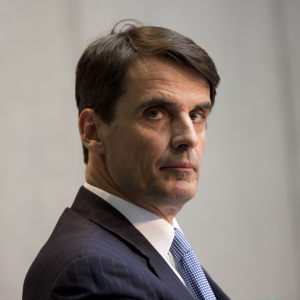It is now impossible to launder money at the Vatican bank, its chairman said today as he released an annual report showing 4,935 accounts had been closed between June 2013 and December 2015. Jean-Baptiste de Franssu explained that the Vatican bank, known as the Institute for the Works of Religion (IOR), has tightened its rules to stop people using the institution to dodge taxes or hide their ill-gotten gains.
Speaking to Vatican Radio today the chairman said that the controls now were so strict that “anyone who would be tempted to use an account in an institution to launder money, the last place he would want to come to is IOR”.
The move to clean up the scandal plagued bank has been a top priority for Pope Francis’ financial reforms in the Holy See and after his election he quickly instituted new leadership including appointing de Franssu. The IOR looks after the money of Catholic entities across the world including dioceses and religious orders and has a total of €5.8 billion in assets. Bishops, Vatican employees and diplomats stationed at the Holy See are all allowed to have accounts at the IOR.
In recent years, however, the bank has been caught up in numerous scandals, including the collapse of Banco Ambrosiano in the 1980s with bribery scandals in Italy in the 1990s. Many believe the troubles stem from the bank’s past lax guidelines which allowed some Italian citizens to open accounts with the bank. “IOR has been affected by a series of abuses,” de Franssu said. “Some of them have been in the real estate sector, others have been more in the securities sector."
Most of the accounts that have been closed were either dormant, contained tiny amounts of money or did not meet criteria needed to hold an account. The chairman also pointed out that money laundering through the IOR had become more difficult due to the tax agreements that the Holy See had signed with a number of countries where the account holders are domiciled. The bank was criticised in a 2012 report by the anti-money laundering agency, Moneyval, for serious accounting failures at the bank. It has since said progress is being made.
IOR’s 2015 annual report showed a big dip in profits from €69 million to €16 million which it said was due to instability in the global economy. The profits are not subsumed into the IOR but handed over to a supervisory body of cardinals who in turn make it available to the Pope. Since his election in 2013, Francis has overhauled Vatican finances, establishing new economic supervision by appointing the tough talking Australian Cardinal George Pell to bring the Holy See up to international financial standards.
The reforms have come up against some opposition with the latest battle over a suspended audit of Vatican finances by global accountants PricewaterhouseCoopers.
KEEP UP TO DATE ON TWITTER AND FACEBOOK...
Follow all the latest news and events from the Catholic world via The Tablet's Twitter feed @the_tablet
Or you can join in the debate at our community page on Facebook




 Loading ...
Loading ...